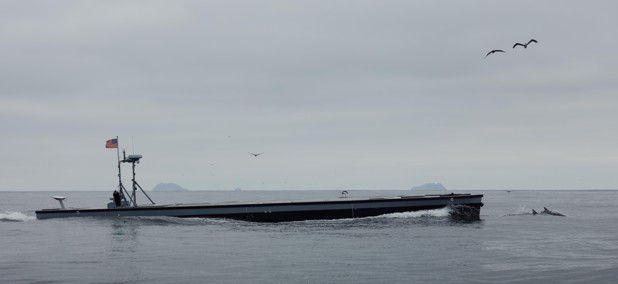In a strategic move to enhance its logistical capabilities in the Indo-Pacific region, the U.S. Marine Corps is testing a new unmanned surface vessel called the Sea Specter. This vessel, developed by Leidos, is designed to transport large quantities of supplies discreetly, echoing the stealthy operations of ‘narco subs’ used by drug traffickers. The testing began nine months after the Marine Corps reached out to Leidos in 2022, seeking a vessel that could operate under the radar.
The Sea Specter, part of the Marine Corps’ Autonomous Low-Profile Vessel program, measures 65 feet in length and maintains a low profile just inches above the water. Its design is inspired by the semi-submersible boats utilized by drug traffickers, but with significant engineering advancements. “I think that it’s OK to say that those narco subs inspired the concept, but that’s where the similarities end,” said Jeff Bowles, chief engineering officer at Gibbs & Cox, a Leidos company, in an interview with Defense One.
Strategic Shift to the Indo-Pacific
This development comes as the Department of Defense shifts its focus from counterinsurgency operations in the Middle East to addressing near-peer conflicts in the Indo-Pacific. The concern is that adversaries could potentially target traditional supply routes, making stealthy logistics a necessity. “So you might not be able to take something that’s a big, high-value target, or something that’s slow moving or highly observable, to deliver re-supplies to the troops, because it might give away their position,” Bowles explained.
The Marines, who are preparing for operations from Pacific islands, are keen on deploying a fleet of these floating logistics drones. These vessels can distribute supplies to multiple outposts simultaneously, enhancing operational flexibility and security.
Advanced Features and Capabilities
Originally designed as remote-controlled vessels, the Sea Specter now includes autonomous features. These are enabled through waypoints or route markers that the boat’s sensors follow to reach its destination. “And it’ll try not to hit anything,” Bowles added, explaining that the vessel can stop and notify for help or perform basic maneuvers to avoid collisions.
The Marine Corps currently has three of these vessels, with a second-generation prototype being tested by the 12th Marine Littoral Regiment in Japan. Equipped with a sensor mounted 8 feet above the deck, the ALPV can detect objects 5 to 7 miles ahead and carry up to 5 tons over 2,300 nautical miles at a speed of 8 knots.
“From Guam to the Philippines is about 1,500 miles. Ideally, they’d send a couple dozen ALPVs loaded with gear, so if they lost half of them, there would still be adequate supplies to deliver,” Bowles said.
Potential Applications and Future Prospects
Beyond logistics, the Sea Specter could serve in communication roles or as a surveillance tool. “This thing could loiter in a prescribed area for a very extended duration,” Bowles noted. “It could also form a picket line to look for intruders.” The vessel’s open architecture allows for customization with different autonomy software, catering to varied operational needs.
The potential for broader military interest is significant, especially if Congress passes the reconciliation bill that includes over $1 billion for small unmanned vehicles. Both the Army and Special Operations Command have shown interest, although no orders have been placed yet.
“The ability to turn out individual variants very quickly, from an operational testing and evaluation perspective, is something that we’re going to find our customers asking of us,” Bowles said.
Material Innovations and Long-term Vision
Currently made of wood, the Sea Specter is expected to evolve in terms of materials used. Leidos is exploring options like fiberglass for its lightweight and corrosion-resistant properties, as well as metals like aluminum or steel, despite their added weight. These changes are aimed at preparing for high-volume production.
Looking ahead, Leidos anticipates the Marine Corps will formalize the ALPV program by 2027. “And we certainly hope that they select Sea Specter to work with,” Bowles concluded, highlighting the company’s commitment to supporting military advancements in stealth logistics.
About The Author
 Veterans Crisis Line Under Scrutiny for Mishandling Complex Calls, GAO Report Reveals
Veterans Crisis Line Under Scrutiny for Mishandling Complex Calls, GAO Report Reveals Spokane City Council Enacts Controversial Citywide Camping Ban Amid Heated Debate
Spokane City Council Enacts Controversial Citywide Camping Ban Amid Heated Debate Bryan Kohberger’s Plea Deal: A Legal and Emotional Crossroads in Idaho
Bryan Kohberger’s Plea Deal: A Legal and Emotional Crossroads in Idaho Son of ‘El Chapo’ to Plead Guilty in U.S. Drug Trafficking Case
Son of ‘El Chapo’ to Plead Guilty in U.S. Drug Trafficking Case Israeli Strike on Gaza Cafe Leaves Families in Mourning
Israeli Strike on Gaza Cafe Leaves Families in Mourning